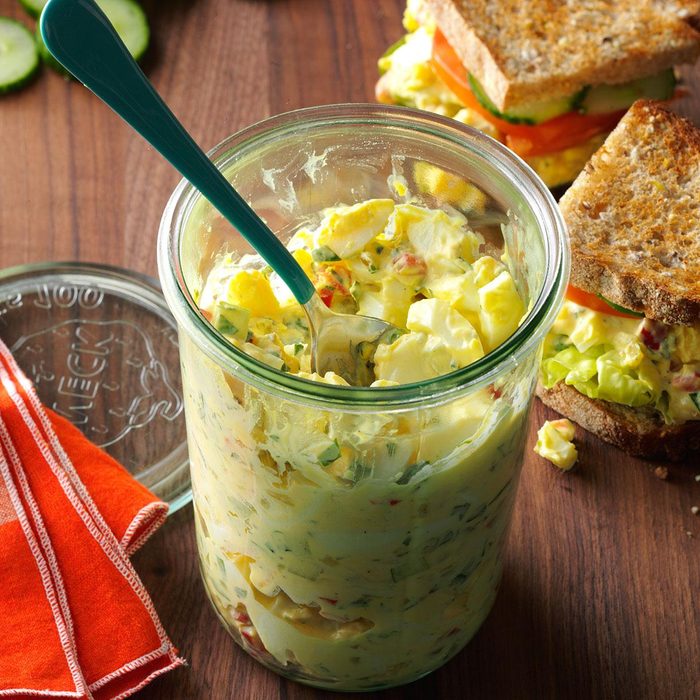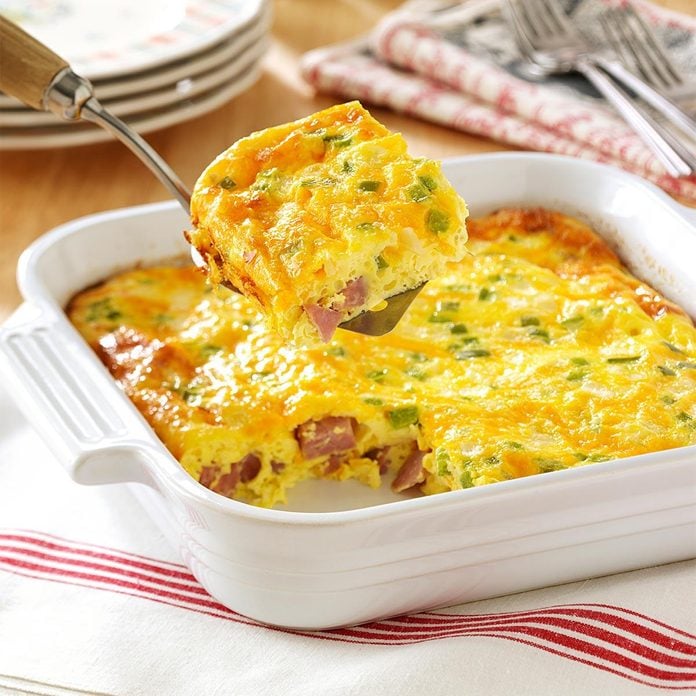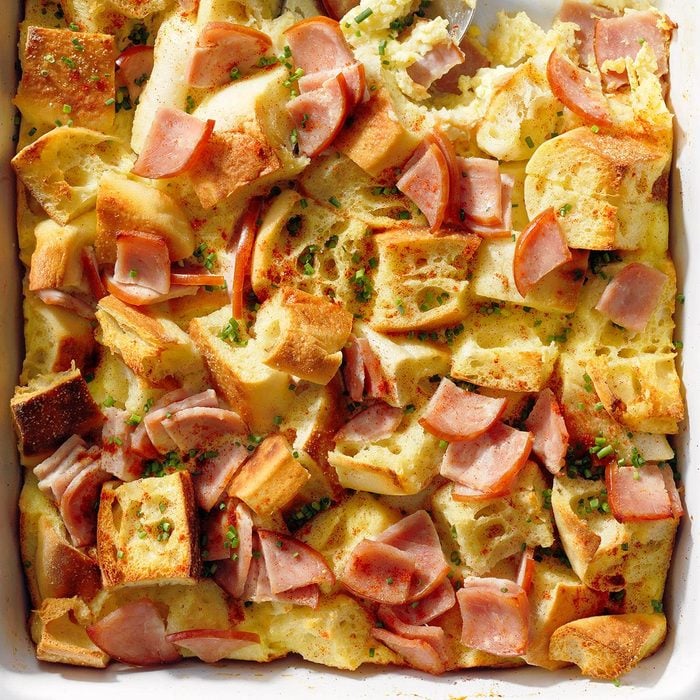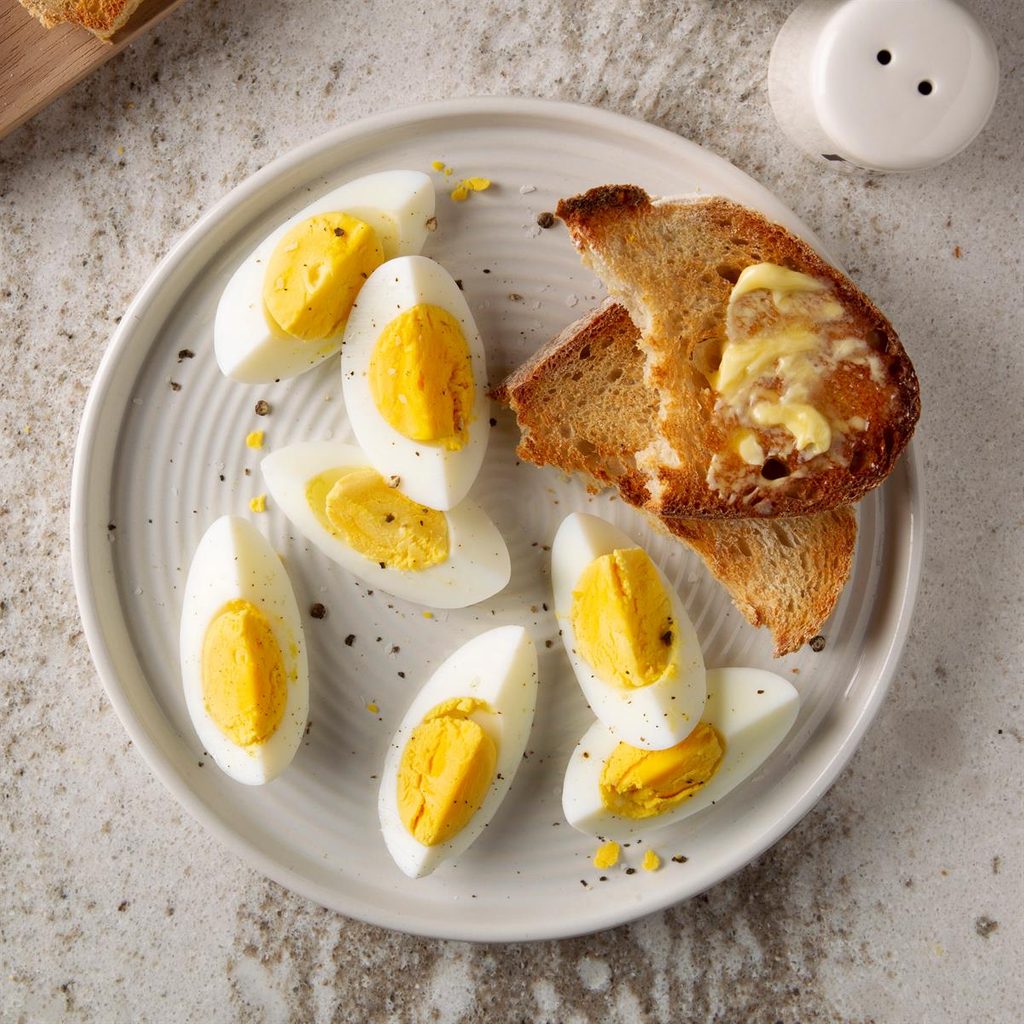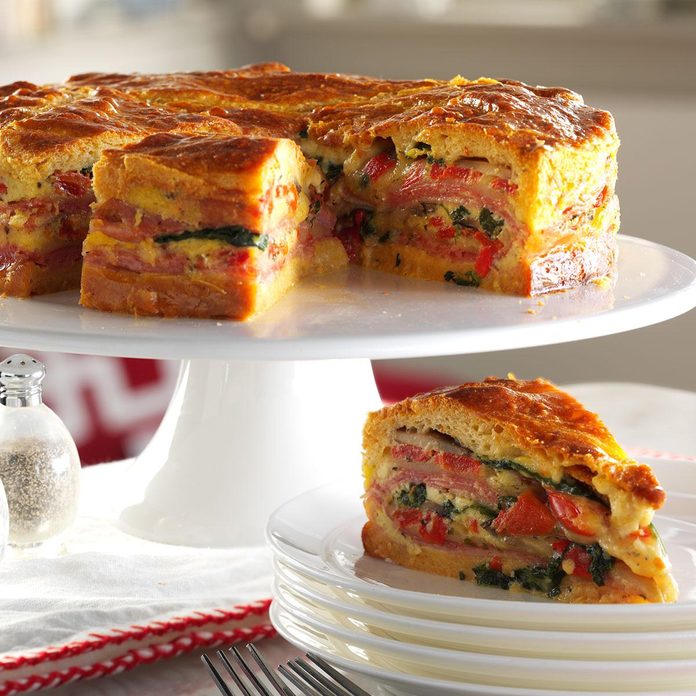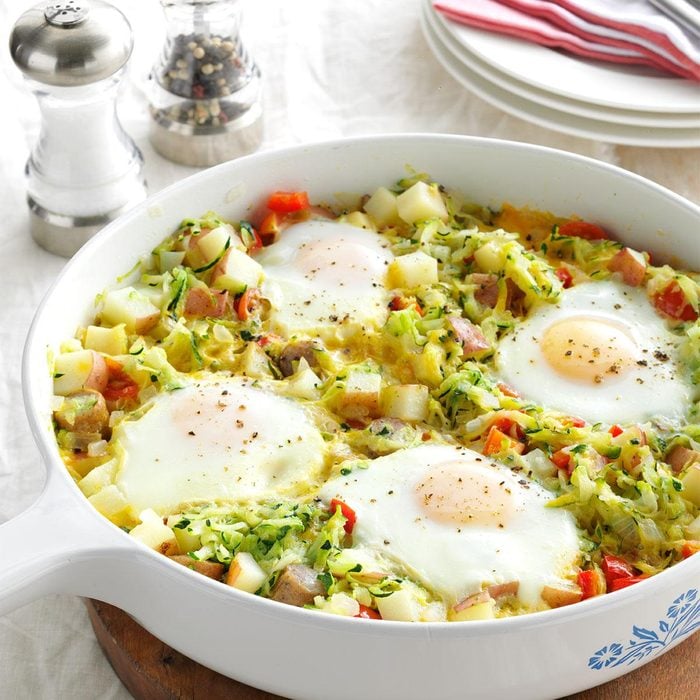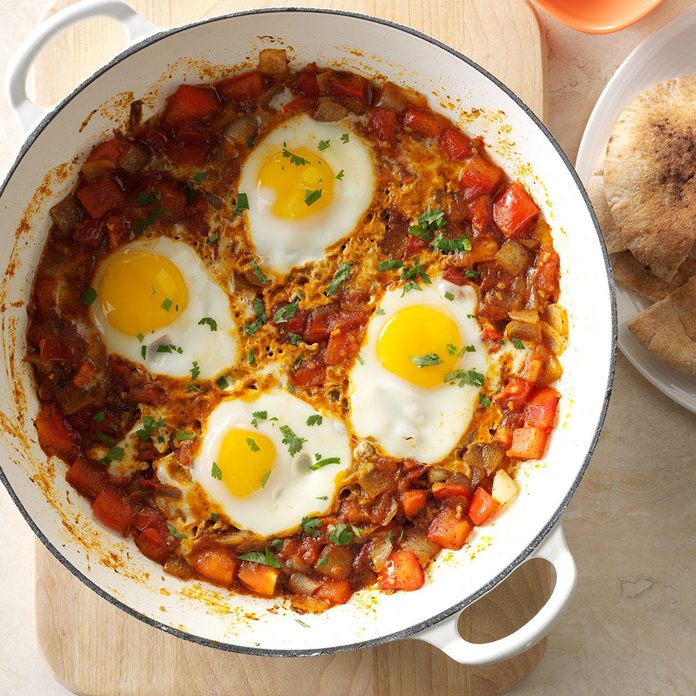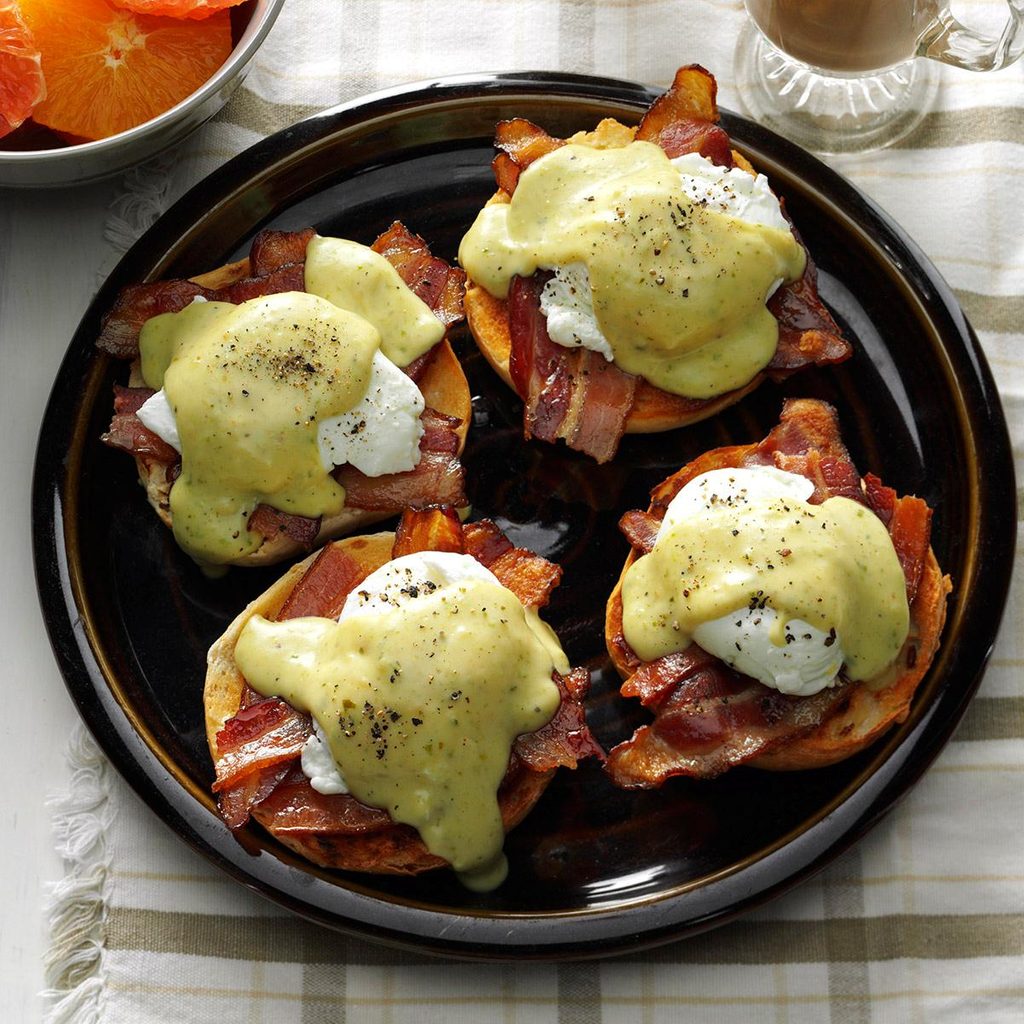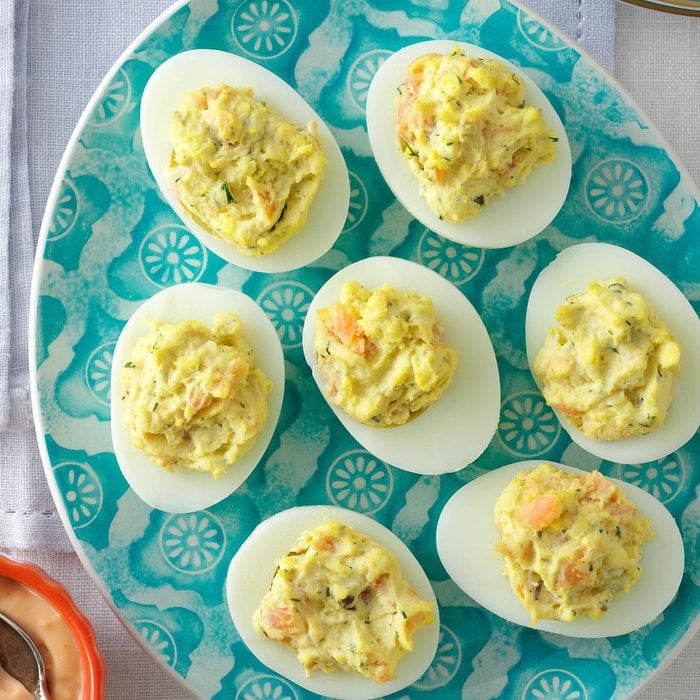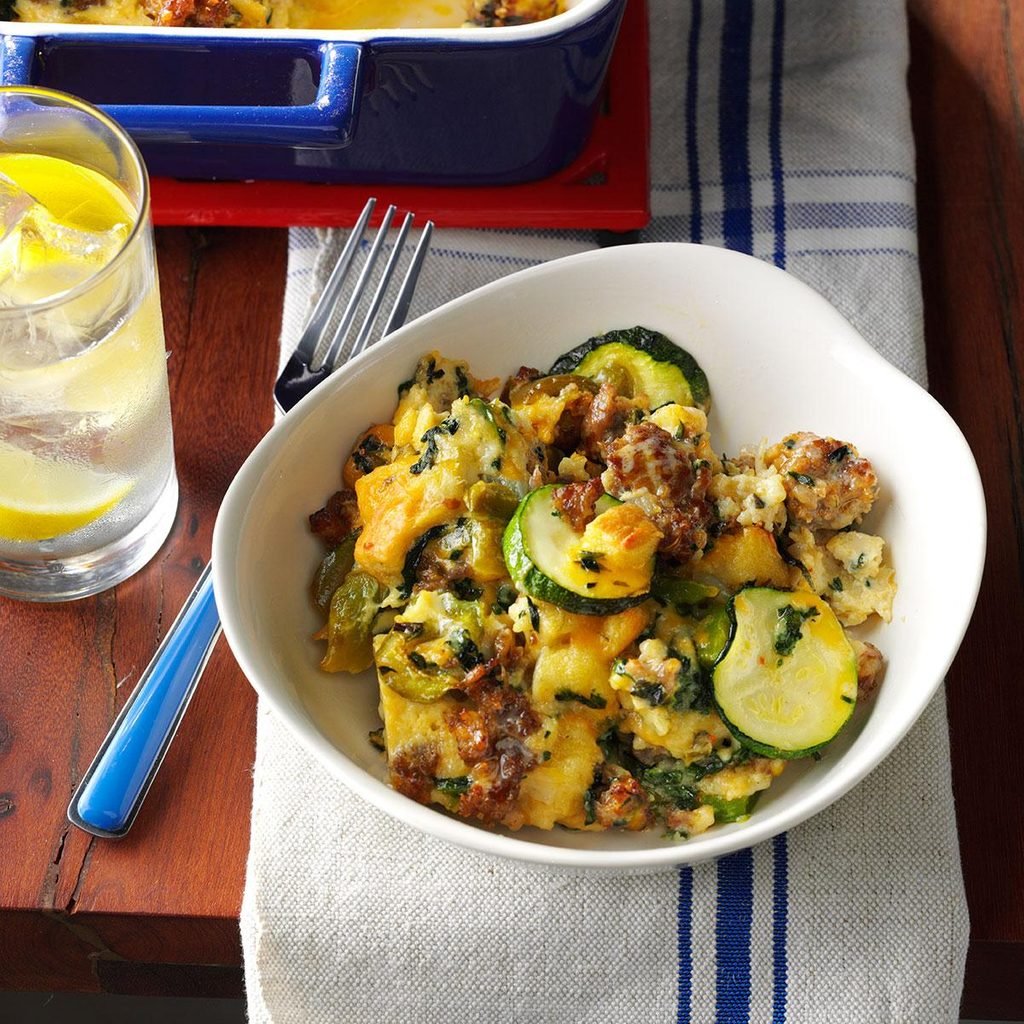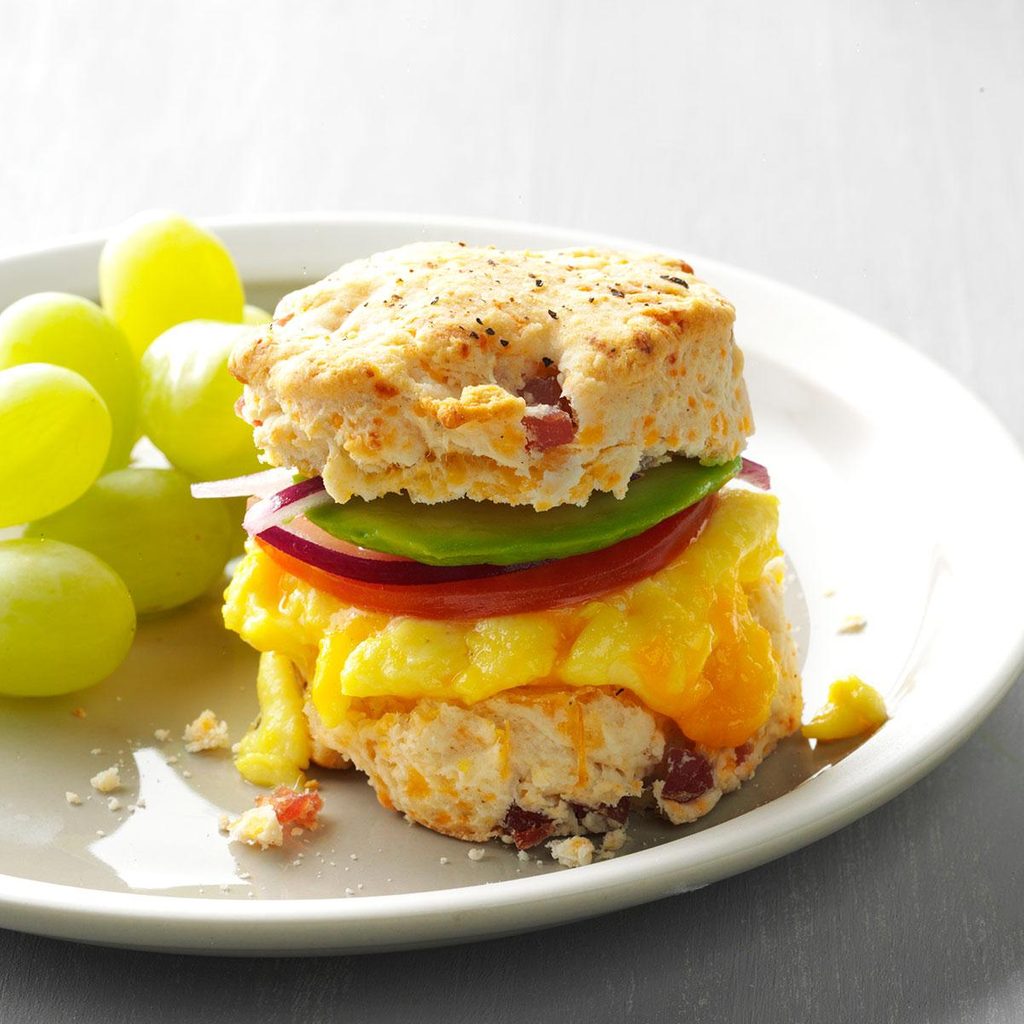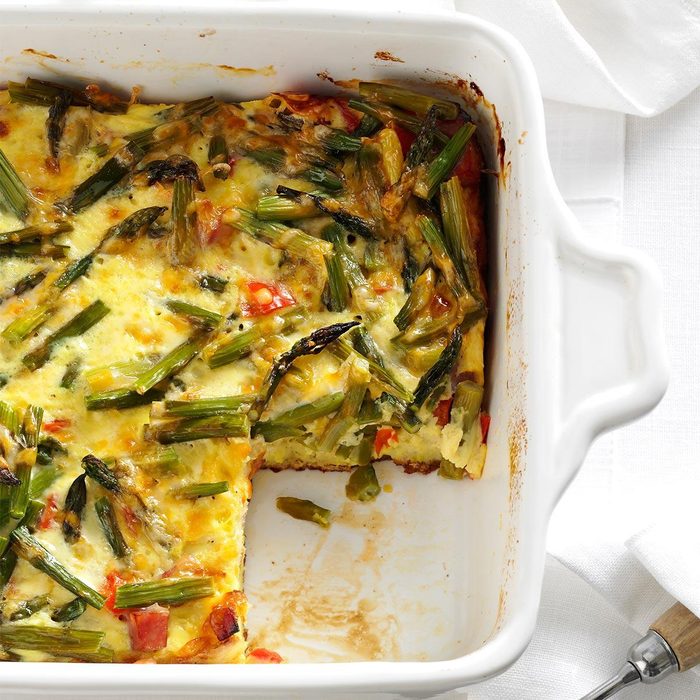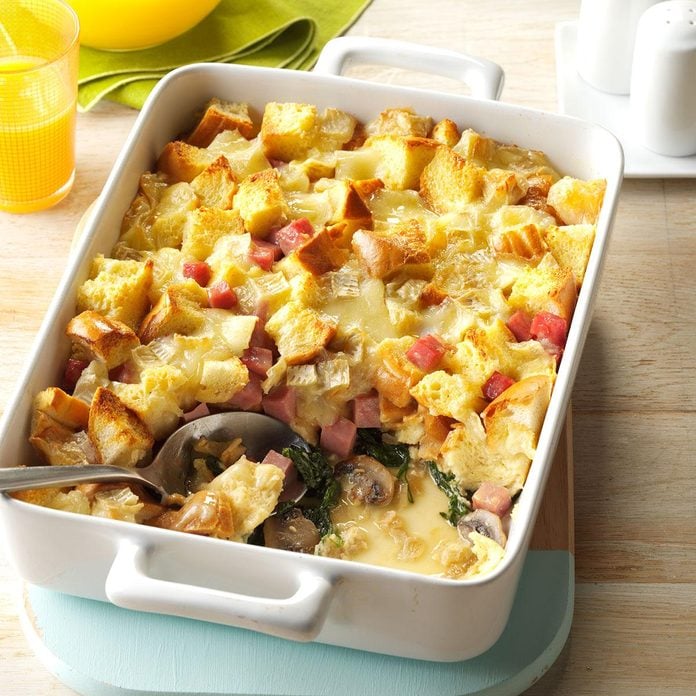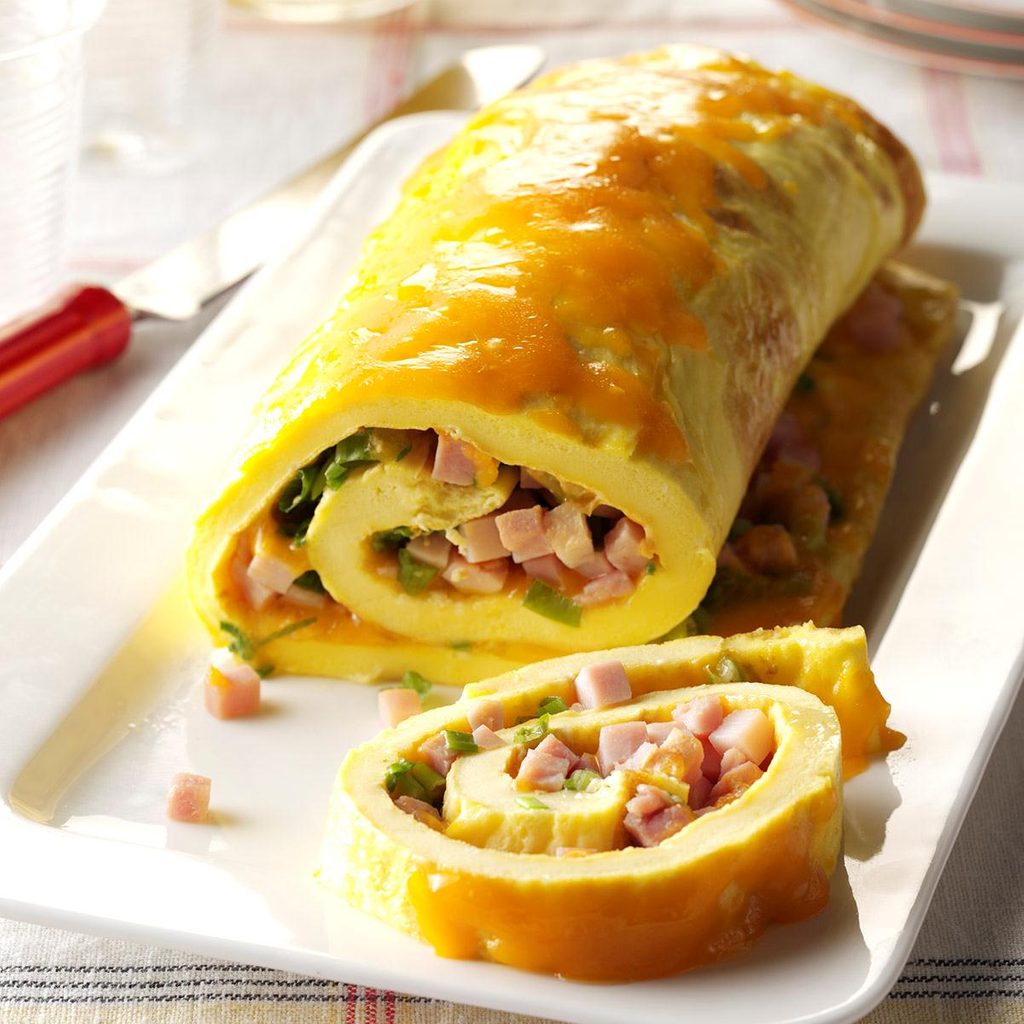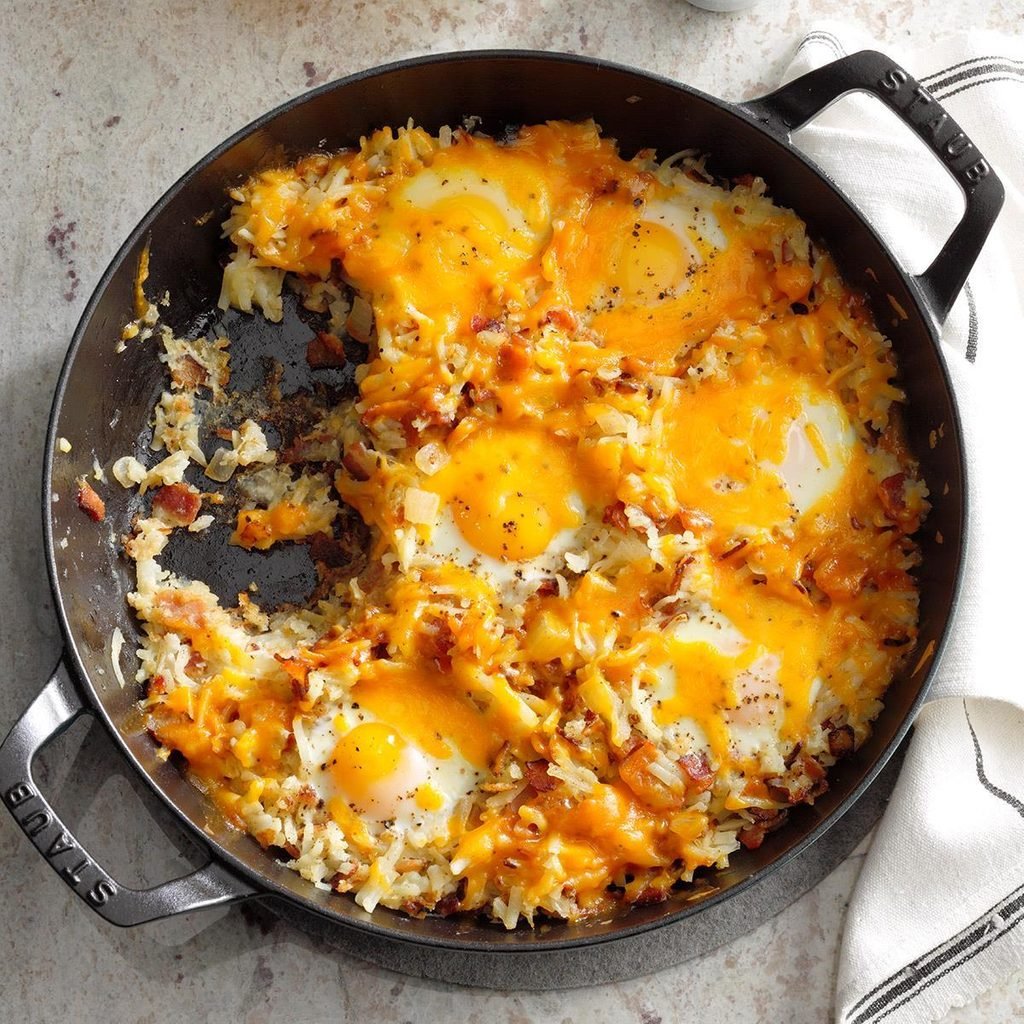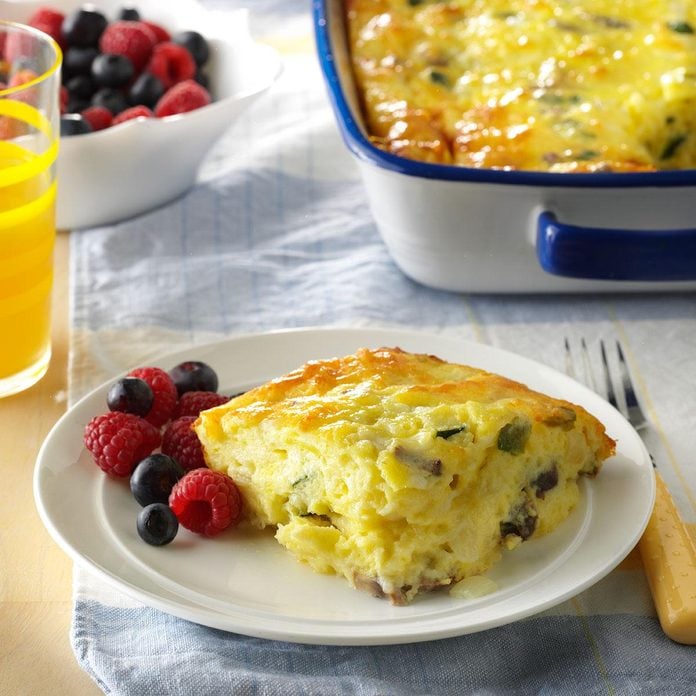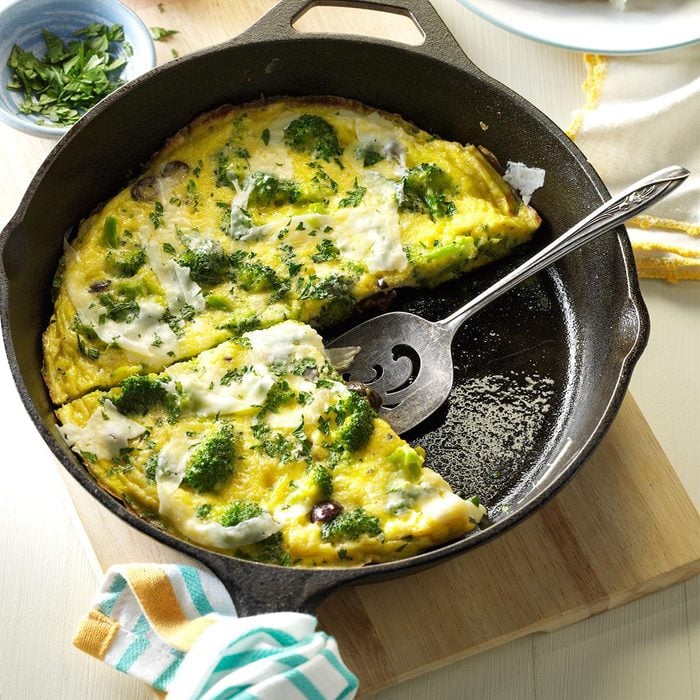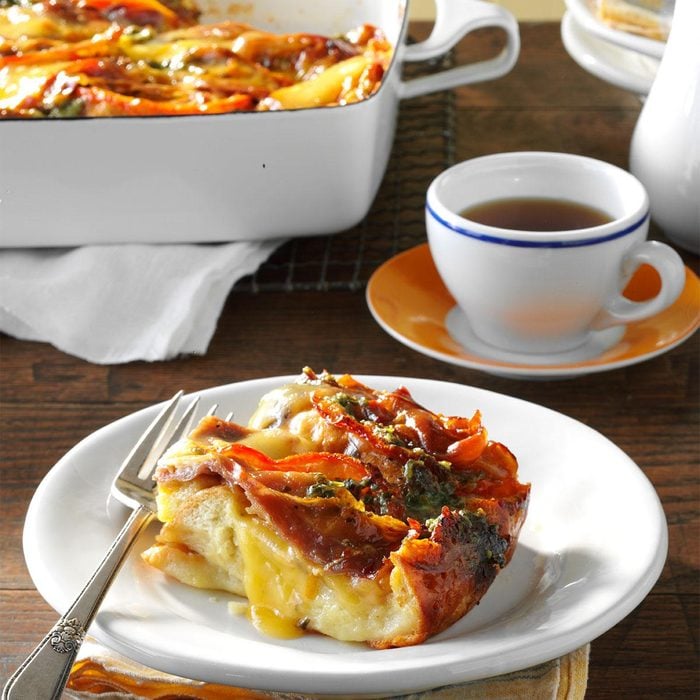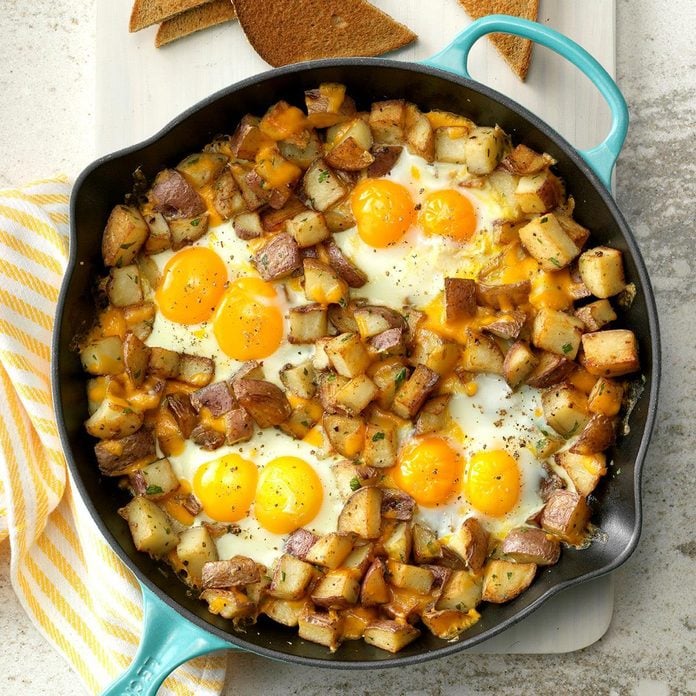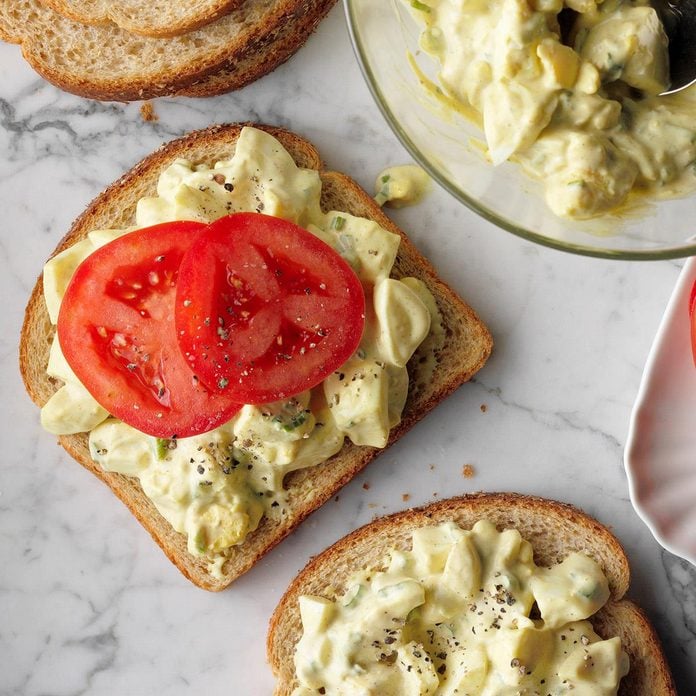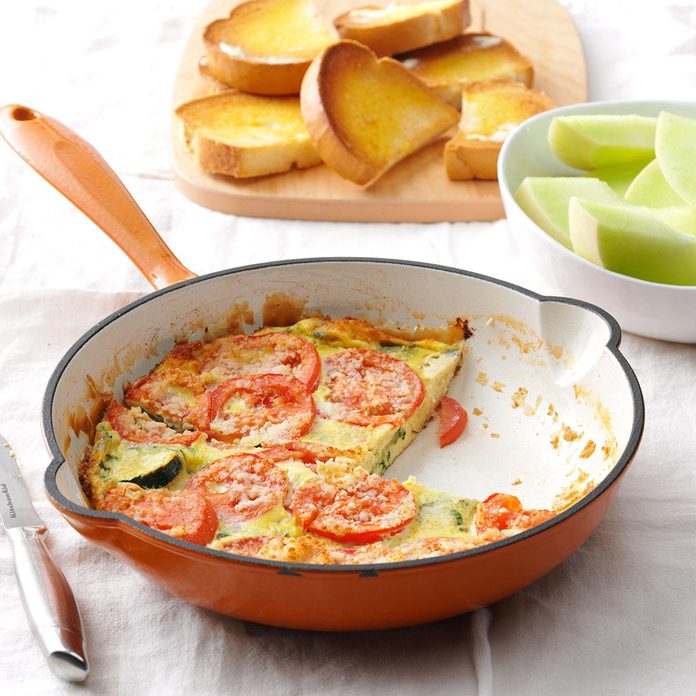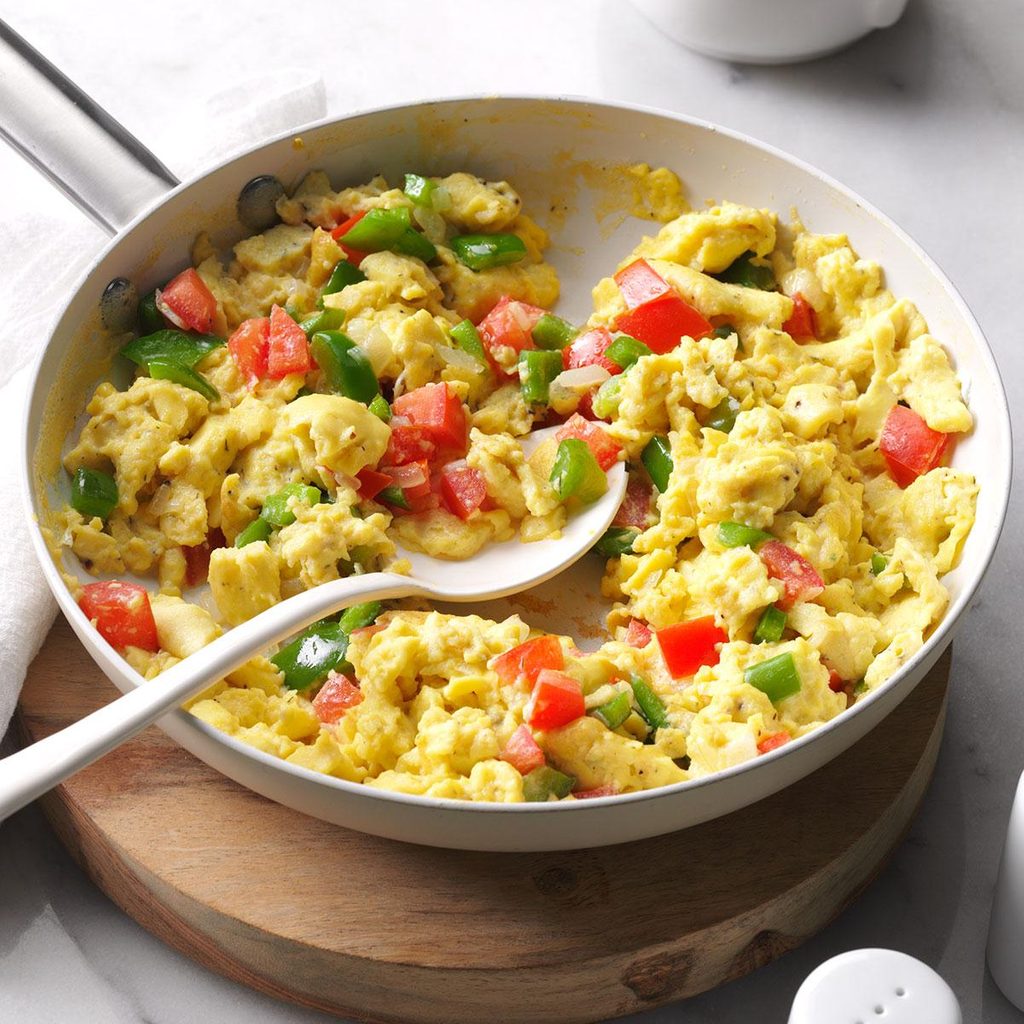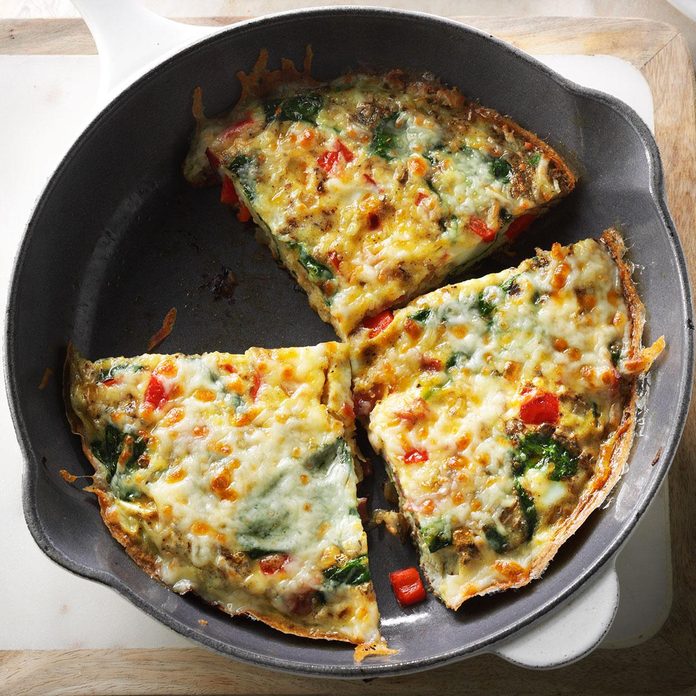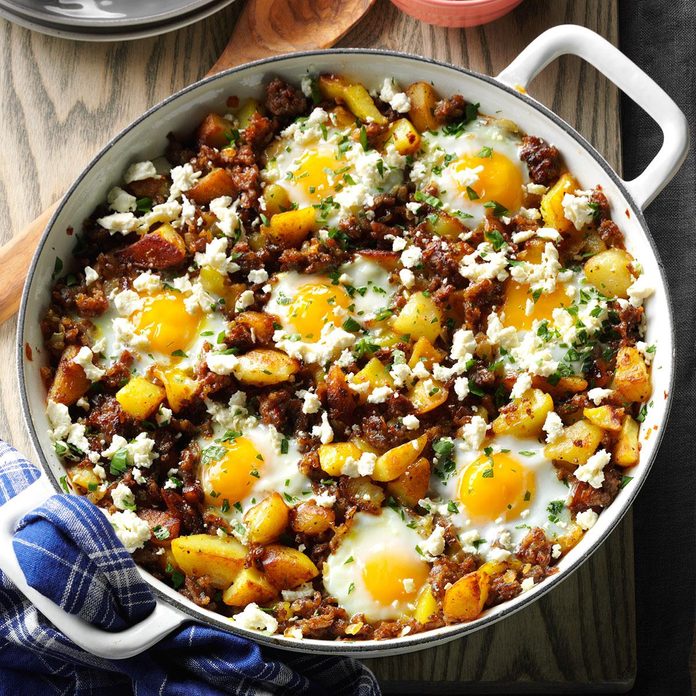 Bacon and Eggs Casserole
Bacon and Eggs Casserole
Because it's fast to fix and such a great hit with family and friends, this egg casserole with bacon is a favorite of mine to make for brunches. Served with a fruit salad, hot muffins and croissants, it's excellent for an after-church meal. —Deanna Durward-Orr, Windsor, Ontario.
Also, check how to crack an egg perfectly every time.
Go to Recipe
Do you know what are Turkish eggs? Here’s everything you need to know about them.
Fluffy Scrambled EggsWhen our son, Chris, wants something other than cold cereal in the morning, he whips up these eggs. Cheese and evaporated milk make them especially good. They're easy to make when you're camping, too. —Chris Pfleghaar, Elk River, Minnesota
Also, check this
scrambled eggs by Ina Garten because once you taste scrambled eggs made Ina Garten’s way, you’ll never go back!
Creamy Egg SaladI love the versatility of this creamy egg salad. You can serve it on a nest of mixed greens, tucked into a sandwich or with your favorite crisp crackers. —Cynthia Kohlberg, Syracuse, Indiana
Oven Denver OmeletI like omelets but don't always have time to stand by the stove. That's why I favor this oven-baked variety that I can quickly pop into the oven at a moment's notice. My family frequently requests this for Sunday brunch. They always empty the dish. —Ellen Bower, Taneytown, Maryland
Breakfast Egg MuffinsAfter enjoying scrambled egg muffins at a local restaurant, I came up with this breakfast egg muffins recipe that my husband likes even better. They're pretty, hearty and fun to serve, too. —Cathy Larkins, Marshfield, Missouri
Eggs Benedict CasseroleThis
eggs Benedict casserole is just as tasty as the classic but without all the hassle. Simply assemble the ingredients ahead, and bake it the next morning for an elegant breakfast or brunch. —Sandie Heindel, Liberty, Missouri
Sausage, Egg and Cheddar Farmers BreakfastThis hearty combination of sausage, hash browns and eggs will warm you up on a cold winter morning. —Bonnie Roberts, Newaygo, Michigan
Cream Cheese & Chive OmeletThe first bite of creamy filling lets you know this isn’t any old omelet. Make it once, and we suspect you’ll be fixing it often. —Anne Troise, Manalapan, New Jersey
Hard-Boiled EggsIn the kitchen, it's important to start with something simple, like how to cook hard-boiled eggs. Use this egg recipe in plenty of dishes, or eat them plain for a quick protein fix. —Taste of Home Test Kitchen
Mind checking
Gordon Ramsay’s scrambled eggs recipe? .Check if it is worth the hype.
Italian Brunch TorteWe always serve this impressive layered breakfast bake with a salad of mixed greens and tomato wedges. It is one of our most requested dishes and can be served warm or cold. —Danny Diamond, Farmington Hills, Michigan
Tip: Freezing eggs can be a time-saving and convenient solution for meal prep! Check
how to freeze eggs so that you to store eggs properly and eliminate food waste in your household.
Zucchini Egg SkilletMy neighbor shared more zucchini from his garden than I knew what to do with. He loved this recipe—it's great for brunch or a special breakfast. —Darcy Kennedy, Hendersonvlle, North Carolina
Ham and Cheese Breakfast CasseroleEggs, ham, potatoes, cheese—our ham and cheese breakfast casserole has all the things you want in a fabulous breakfast or brunch.
Yankee RancherosAfter my in-laws began affectionately referring to me as a Yankee, I decided I had to learn to make some Mexican dishes. These are super easy and make my Tex-Mex-loving family happy—even if they do come from a Northerner!. —Darla Andrews, Boerne, Texas
Sausage Tortilla Breakfast BakeThis casserole combines spices of the Southwest with the comfort of a hearty breakfast that is perfect for brunch. You can spice it up by adding cayenne and hot peppers, or mellow it out by replacing the tomatoes and green chiles with mild salsa. It’s versatile and easy—no wonder it’s a longtime family favorite. —Darlene Buerger, Peoria, Arizona
Brunch BurritosI like to use a second slow cooker to keep the tortillas warm and pliable when I serve these hearty burritos. Just place a clean wet cloth in the bottom, then cover it with foil and add your tortillas.—Beth Osburn, Levelland, Texas
ShakshukaThis easy shakshuka recipe features eggs gently poached in a simmering mixture of tomatoes, onions, garlic and a few warm spices.
Bacon ‘n’ Egg LasagnaMy sister-in-law served this special dish for
Easter breakfast one year, and our whole family loved the mix of bacon, eggs, noodles and cheese. Now I sometimes assemble it the night before and bake it in the morning for a terrific hassle-free brunch entree. —Dianne Meyer, Graniteville, Vermont
Italian Cloud EggsDrop egg yolks on nests of whipped Italian-seasoned egg whites, then bake in a cast-iron skillet. Dreamy!—Matthew Hass, Franklin, Wisconsin
Creamy Pesto ‘n Bacon Eggs BenedictOne of my favorite brunch dishes is eggs Benedict. While I adore the traditional version, I also have fun using other flavors. This is my Italian take using a semi-homemade creamy pesto sauce.—Jenn Tidwell, Fair Oaks, California
Smoked Salmon Deviled EggsFlaky salmon and creamy sauce go so well over hard-boiled eggs. Drizzle the sauce or serve it on the side; it's great either way. —Marinela Dragan, Portland, Oregon
Also, check our easy techniques for
how to boil eggs which will make you an eggs expert in no time.
Breakfast Bread BowlsThe best part about these creative and convenient bread bowls is that you can fill them with whatever you want. This is one of our favorite breakfasts. —Patrick Lavin, Jr., Birdsboro, Pennsylvania
Southwestern Hash with EggsBefore I retired, this all-in-one skillet dish was constantly requested at office brunches. I'd leave out the eggs, double or triple the recipe and wrap servings of the zippy pork mixture in warm corn tortillas. —Barbara Beasley, Beaumont, Texas
Eggsquisite Breakfast CasseroleI developed this recipe over 20 years ago. The rich warm sauce tastes especially great on cold winter mornings. I hope your family enjoys it as much as mine! — Bee Fischer, Jefferson, Wisconsin
Veggie Sausage StrataAs a retired home economics teacher, I've made quite a few recipes through the years. This hearty casserole is a favorite in my family. —Dorothy Erickson, Blue Eye, Missouri
Bacon & Mushroom OmeletsI had grown tired of the same breakfast meals, so I wanted to make something more interesting. These fresh and flavorful omelets come with a versatile sauce that can also be used as a nacho dip. —Susan Kieboam, Streetsboro, Ohio
Cheesy Ham & Egg SandwichesI turned classic breakfast sandwiches into something heartier that you could even enjoy for dinner. We pile toppings like salsa and avocado—mayo and ketchup, too—on the homemade biscuits. —Fay Moreland, Wichita Falls, Texas
Brunch PizzaWhenever I entertain guests, this zippy pizza is a definite crowd-pleaser. It also makes a great late-night snack for any time of the year! —Janelle Lee, Appleton, Wisconsin
Mushroom-Avocado Eggs on ToastTwo of my favorites – mushroom and avocado – make a stacked sandwich fancy enough for company or a weekend breakfast with the family. —Carol McLaughlin, Papillion, Nebraska
Overnight Asparagus StrataI've made this tasty egg dish for breakfast, brunch, even dinner as a side dish. This is not your run-of-the-mill strata. —Lynn Licata, Sylvania, Ohio
Eggs BenedictYou don't have to brave the brunch rush for a plate of eggs Benedict. Learn how to make poached eggs and hollandaise sauce for breakfast at home.
Ham & Brie StrataThere's nothing quite like my comfy strata made with Brie, ham and mushrooms. Put it together and bake it now, or hold it overnight to pop into the oven tomorrow. —Elisabeth Larsen, Pleasant Grove, Utah
Ham ‘n’ Cheese Omelet RollThis brunch dish has easy ingredients and an impressive look all rolled into one! I love hosting brunch, and this special omelet roll is one of my very favorite items to prepare and share. A platter of these pretty swirled slices disappears fast. —Nancy Daugherty, Portland, Ohio
Sheepherder’s BreakfastMy sister-in-law always made this delicious breakfast dish when we were camping and had to come up with good,
easy breakfast ideas. Served with toast, juice and milk or coffee, it's a sure hit with the breakfast crowd! One-dish casseroles like this were a big help while I was raising my nine children. Now I've passed this recipe on to them. —Pauletta Bushnell, Albany, Oregon
Cheesy Vegetable Egg DishI'm a cook at a Bible camp, and this is one of my most popular recipes. Everyone who tries it raves about it. The one that touched me the most was when a 10-year-old boy asked me for the recipe so he could have his mom make it at home. —Elsie Campbell, Dulzura, California
Mediterranean Broccoli & Cheese OmeletMy Italian mother-in-law taught me to make this omelet years ago—she would make it for breakfast, lunch or dinner and eat it on Italian bread. This is one of my favorite ways to use up leftover broccoli. —Mary Licata, Pembroke Pines, Florida
Prosciutto-Pesto Breakfast StrataI'd never tried prosciutto before this recipe, and it instantly made me a big-time fan! The layers of flavor in this dish are brilliant, making it well worth the time and a must for your recipe box. —Vicki Anderson, Farmington, Minnesota
Stir-Fry Rice BowlMy meatless version of Korean
bibimbap is tasty, pretty and easy to tweak for different spice levels. —Devon Delaney, Westport, Connecticut
Breakfast CasseroleThis easy overnight breakfast casserole will become your new go-to recipe any time you have company in town.
Baked Cheddar Eggs & PotatoesI love making breakfast recipes with eggs for dinner, especially this combo with potatoes and cheese that's started in a skillet on the stovetop and then popped into the oven to bake. —Nadine Merheb, Tucson, Arizona
Curried Egg SaladA curry kick gives this egg salad big appeal. We love it when the weather gets warm. —Joyce McDowell, West Union, Ohio
Amish Breakfast CasseroleWe enjoyed hearty breakfast casseroles during a visit to an Amish inn. When I asked for a recipe, one of the women told me the ingredients right off the top of her head. I modified it a bit to create this version that my family loves. —Beth Notaro, Kokomo, Indiana
Italian Garden FrittataI like to serve this pretty frittata with melon wedges for a delicious breakfast or brunch. —Sally Maloney, Dallas, Georgia
Italian Sausage Egg BakeThis hearty entree warms up any breakfast or brunch menu with its herb-seasoned flavor. —Darlene Markham, Rochester, New York
Calico Scrambled EggsWhen you're short on time and scrambling to get a meal on the table, this recipe is just what you need. There's a short ingredient list, cooking is kept to a minimum. and the green pepper and tomato makes it colorful. —Taste of Home Test Kitchen
Salsa & Scrambled Egg SandwichesPower up with a breakfast that keeps you going all morning long. In my humble opinion, this sandwich tastes so much better than anything that comes from a drive-thru! —Marcia Conlon, Traverse City, Michigan
Frittata FlorentineMy family is all about brunchy meals like this gorgeous Italian omelet. Lucky for us, it’s loaded with ingredients we tend to have at the ready. —Jenny Flake, Newport Beach, California
What's in the Fridge FrittataGreat for a last-minute breakfast, brunch or lunch, this special frittata has a combination of crab and Swiss cheese that my guests rave about. I also like to use sausage and cheddar cheese with asparagus. —Deborah Posey, Virginia Beach, Virginia
Brunch Hash & Egg BakeWhen my kids were growing up, I was cooking for eight. I couldn't conveniently fry eggs for that many people, so I devised this recipe that became a family favorite. Mild and salty feta cheese is my favorite for the dish, but shredded cheddar or Parmesan work, too. —Lily Julow, Lawrenceville, Georgia
Up next: The
best quiche recipes for a light meal

























